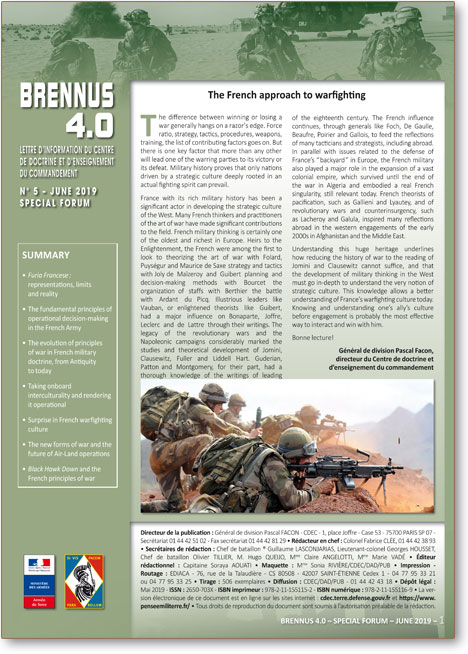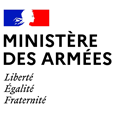June 2019. The difference between winning or losing a war generally hangs on a razor’s edge. Force ratio, strategy, tactics, procedures, weapons, training, the list of contributing factors goes on.
Read the full document : Brennus 4.0 - #5 - The French approach to warfighting

The difference between winning or losing a war generally hangs on a razor’s edge. Force ratio, strategy, tactics, procedures, weapons, training, the list of contributing factors goes on. But there is one key factor that more than any other will lead one of the warring parties to its victory or its defeat. Military history proves that only nations driven by a strategic culture deeply rooted in an actual fighting spirit can prevail.
France with its rich military history has been a significant actor in developing the strategic culture of the West. Many French thinkers and practitioners of the art of war have made significant contributions to the field. French military thinking is certainly one of the oldest and richest in Europe. Heirs to the Enlightenment, the French were among the first to look to theorizing the art of war with Folard, Puységur and Maurice de Saxe strategy and tactics with Joly de Maïzeroy and Guibert planning and decision-making methods with Bourcet the organization of staffs with Berthier the battle with Ardant du Picq. Illustrious leaders like Vauban, or enlightened theorists like Guibert, had a major influence on Bonaparte, Joffre, Leclerc and de Lattre through their writings. The legacy of the revolutionary wars and the Napoleonic campaigns considerably marked the studies and theoretical development of Jomini, Clausewitz, Fuller and Liddell Hart. Guderian, Patton and Montgomery, for their part, had a thorough knowledge of the writings of leading French thinkers of the eighteenth century. The French influence continues, through generals like Foch, De Gaulle, Beaufre, Poirier and Gallois, to feed the reflections of many tacticians and strategists, including abroad. In parallel with issues related to the defense of France’s “ backyard ” in Europe, the French military also played a major role in the expansion of a vast colonial empire, which survived until the end of the war in Algeria and embodied a real French singularity, still relevant today. French theorists of pacification, such as Gallieni and Lyautey, and of revolutionary wars and counterinsurgency, such as Lacheroy and Galula, inspired many reflections abroad in the western engagements of the early 2000s in Afghanistan and the Middle East.
Understanding this huge heritage underlines how reducing the history of war to the reading of Jomini and Clausewitz cannot suffice, and that the development of military thinking in the West must go in-depth to understand the very notion of strategic culture. This knowledge allows a better understanding of France’s warfighting culture today. Knowing and understanding one’s ally’s culture before engagement is probably the most effective way to interact and win with him.
Bonne lecture!
Général de division Pascal Facon, directeur du Centre de doctrine et d’enseignement du commandement
Table of contents
- Furia Francese : representations, limits and reality
- The fundamental principles of operational decision-making in the French Army
- The evolution of principles of war in French military doctrine, from Antiquity to today
- Taking onboard interculturality and rendering it operational
- Surprise in French warfighting culture
- The new forms of war and the future of Air-Land operations
- Black Hawk Down and the French principles of war








